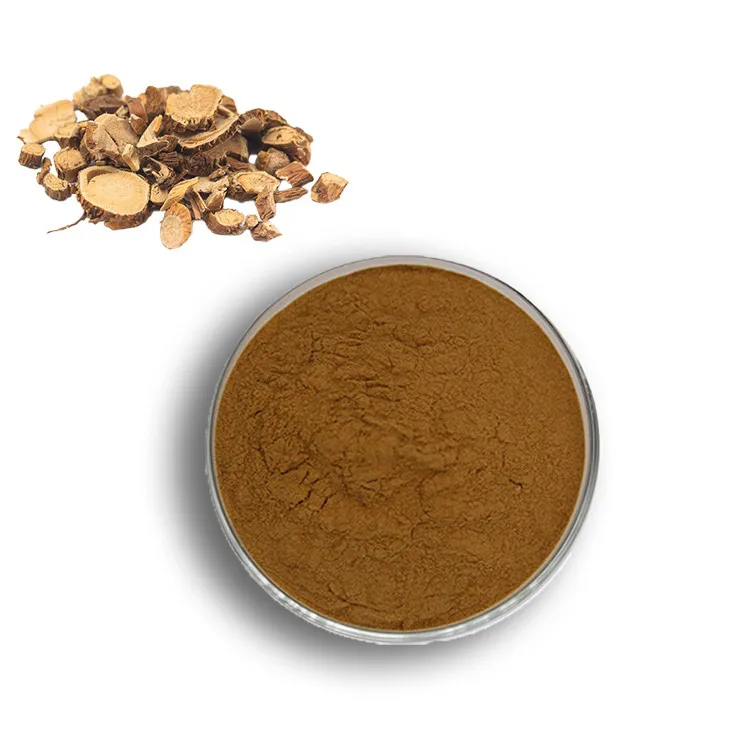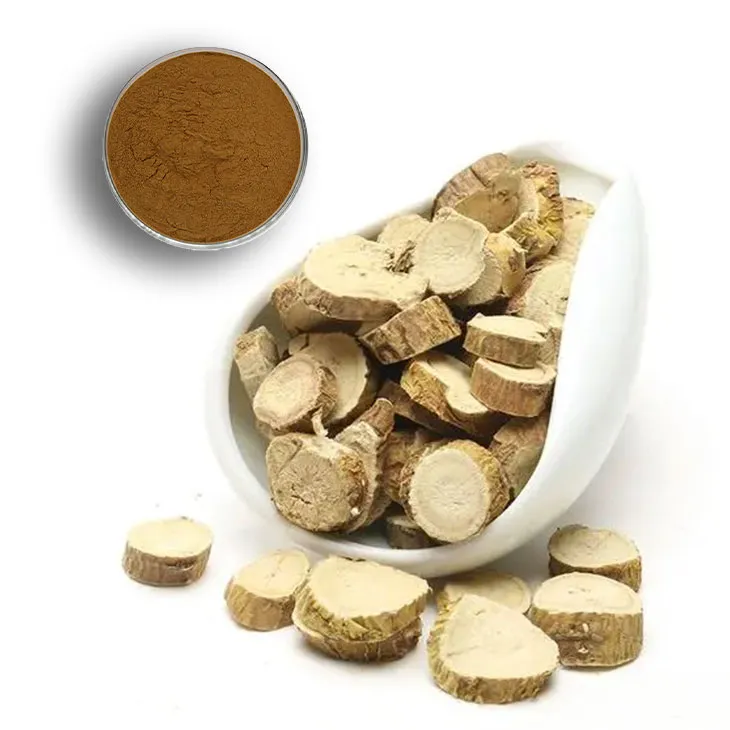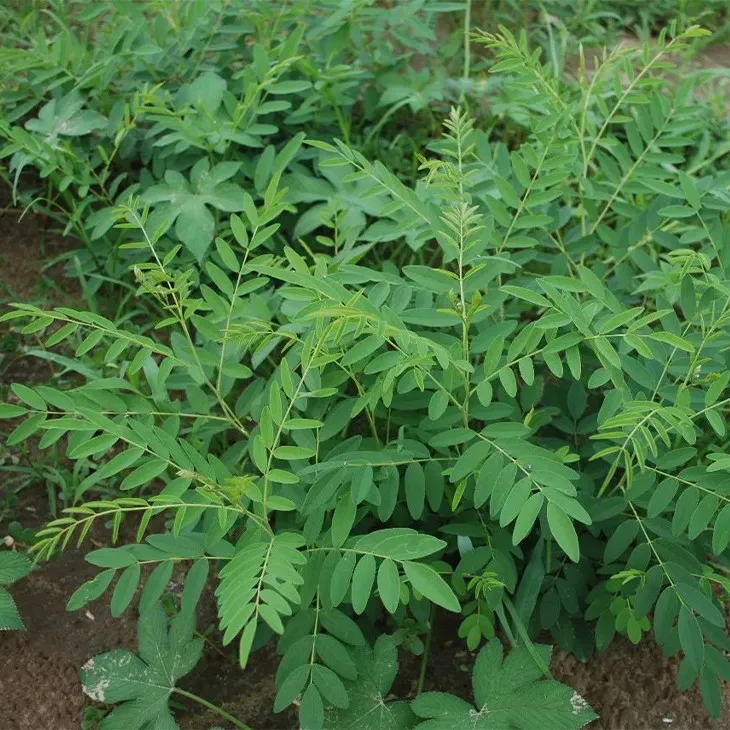- 0086-571-85302990
- sales@greenskybio.com
Benefits of Sophora flavescens Root Extract in Cattle Feed.
2024-11-12

Introduction
In the field of cattle farming, the search for natural and effective additives in cattle feed is an ongoing process. Sophora Flavescens Root Extract has emerged as a promising candidate. This extract, derived from the roots of the Sophora flavescens plant, holds great potential in enhancing various aspects of cattle health and productivity.

Antibacterial Activity
One of the most significant benefits of Sophora Flavescens Root Extract in cattle feed is its antibacterial activity.
The Importance of a Healthy Intestinal Tract
The intestinal tract of cattle is a complex ecosystem that houses a vast number of bacteria. Maintaining a healthy balance between beneficial and harmful bacteria is crucial for the overall well - being of the animals. Harmful bacteria can cause various health problems, such as diarrhea, reduced nutrient absorption, and decreased growth rates.
How the Extract Inhibits Harmful Bacteria
Sophora Flavescens Root Extract contains several bioactive compounds that have been shown to possess antibacterial properties. These compounds can target and disrupt the cell membranes of harmful bacteria, interfere with their metabolic processes, or prevent their replication. For example, some alkaloids present in the extract can bind to specific sites on the bacterial cell surface, leading to the leakage of intracellular components and ultimately cell death.
Benefits for Cattle Health
By inhibiting the growth of harmful bacteria in the intestinal tract, the extract helps to keep the digestive system functioning optimally. This results in better nutrient absorption, as the beneficial bacteria can thrive in a more favorable environment. Cattle are then able to obtain more energy and essential nutrients from their feed, which is reflected in improved growth performance, including increased weight gain and better feed conversion ratios.

Regulation of Physiological Functions
Another important aspect of Sophora flavescens root extract in cattle feed is its ability to regulate physiological functions.
Hormonal Balance
Hormones play a vital role in the growth, development, and reproduction of cattle. The extract can influence the endocrine system, helping to maintain hormonal balance. For instance, it may affect the production or release of hormones such as growth hormone, insulin - like growth factor - 1 (IGF - 1), and reproductive hormones.
- Growth hormone is essential for promoting muscle growth and overall body development in cattle. By modulating its levels, the extract can contribute to increased muscle mass and improved carcass quality.
- IGF - 1 is involved in cell proliferation and differentiation. A balanced level of IGF - 1, influenced by the extract, can enhance tissue repair and growth in cattle.
- In terms of reproductive hormones, the extract may help regulate the estrous cycle in female cattle and improve sperm quality in male cattle. This can have a significant impact on the breeding efficiency and fertility of the herd.
Immune System Regulation
The immune system of cattle is responsible for protecting the animals from various pathogens. Sophora flavescens root extract can play a role in modulating the immune response. It may enhance the activity of immune cells, such as macrophages and lymphocytes, which are involved in recognizing and eliminating foreign invaders.
Moreover, the extract can help regulate the production of cytokines, which are signaling molecules in the immune system. By maintaining a proper cytokine balance, the extract can prevent excessive immune responses that could lead to inflammation and tissue damage, while also ensuring that the immune system is capable of mounting an effective defense against infections.

Antioxidant Effects
The antioxidant effects of Sophora flavescens root extract are also of great importance in cattle feed.
Oxidative Stress in Cattle
Cattle are constantly exposed to various sources of oxidative stress, such as environmental pollutants, certain feed components, and normal metabolic processes. Oxidative stress occurs when there is an imbalance between the production of reactive oxygen species (ROS) and the ability of the body's antioxidant defense systems to neutralize them. High levels of ROS can cause damage to cells, including DNA damage, lipid peroxidation, and protein oxidation.
How the Extract Acts as an Antioxidant
Sophora flavescens root extract contains antioxidant compounds that can scavenge ROS and prevent oxidative damage. These compounds can donate electrons to ROS, converting them into less harmful substances. For example, phenolic compounds present in the extract have been shown to have strong antioxidant activity.
Benefits for Cell Protection and Overall Vitality
By protecting cells from oxidative damage, the extract helps to maintain the integrity of various tissues and organs in cattle. This is particularly important for organs such as the liver, which is involved in many metabolic processes, and the heart, which is essential for maintaining proper circulation.
In addition, the antioxidant effects of the extract can enhance the overall vitality of cattle. Cattle with reduced oxidative stress are more likely to have better growth performance, improved immune function, and increased resistance to diseases.
Conclusion
In conclusion, the use of Sophora flavescens root extract in cattle feed offers a range of benefits. Its antibacterial activity helps maintain a healthy intestinal tract, its regulation of physiological functions promotes growth, development, and reproduction, and its antioxidant effects protect cells from damage. As research continues, further understanding of the mechanisms and potential applications of this extract in cattle farming may lead to more widespread and optimized use, contributing to the improvement of cattle health and productivity in the agricultural industry.
FAQ:
1. What are the main antibacterial mechanisms of Sophora flavescens root extract in cattle feed?
The antibacterial mechanisms may involve multiple aspects. It may disrupt the cell membranes of harmful bacteria, interfere with their metabolic processes, or inhibit the synthesis of essential components for bacterial growth. However, the exact mechanisms are still under further research.
2. How does Sophora flavescens root extract promote hormonal balance in cattle?
It might interact with the endocrine system of cattle. It could influence the production, release, or activity of certain hormones. For example, it may affect the glands responsible for hormone secretion, or modulate the signaling pathways related to hormonal regulation, but specific details need more in - depth study.
3. Can the antioxidant effect of Sophora flavescens root extract be measured quantitatively in cattle?
Yes, it can be measured quantitatively. There are various methods such as measuring the levels of antioxidant enzymes (like superoxide dismutase) or detecting the levels of oxidative stress markers (such as malondialdehyde). By comparing the values in cattle fed with and without Sophora flavescens root extract, the quantitative antioxidant effect can be evaluated.
4. Are there any potential side effects of using Sophora flavescens root extract in cattle feed?
While Sophora flavescens root extract has many benefits, there may be potential side effects if used inappropriately. For example, excessive amounts may cause digestive problems or interfere with the normal flora balance in the gut. However, when used within the appropriate dosage range, these side effects are less likely to occur.
5. How should Sophora flavescens root extract be added to cattle feed in terms of dosage?
The dosage should be determined based on factors such as the age, weight, and health status of the cattle. Generally, it is recommended to start with a small amount and gradually increase while closely observing the cattle's response. Consulting a veterinarian or an expert in animal nutrition is also advisable to ensure the correct dosage.
Related literature
- The Role of Natural Extracts in Cattle Nutrition"
- "Antibacterial and Antioxidant Properties of Plant Extracts in Animal Feed"
- "Sophora flavescens Root Extract: Composition and its Impact on Livestock Health"
- ▶ Hesperidin
- ▶ Citrus Bioflavonoids
- ▶ Plant Extract
- ▶ lycopene
- ▶ Diosmin
- ▶ Grape seed extract
- ▶ Sea buckthorn Juice Powder
- ▶ Fruit Juice Powder
- ▶ Hops Extract
- ▶ Artichoke Extract
- ▶ Mushroom extract
- ▶ Astaxanthin
- ▶ Green Tea Extract
- ▶ Curcumin
- ▶ Horse Chestnut Extract
- ▶ Other Product
- ▶ Boswellia Serrata Extract
- ▶ Resveratrol
- ▶ Marigold Extract
- ▶ Grape Leaf Extract
- ▶ New Product
- ▶ Aminolevulinic acid
- ▶ Cranberry Extract
- ▶ Red Yeast Rice
- ▶ Red Wine Extract
-
Bilberry Extract
2024-11-12
-
Bamboo Leaf extract
2024-11-12
-
Diosmin
2024-11-12
-
Lotus leaf extract
2024-11-12
-
Beetroot Powder
2024-11-12
-
Kelp Extract Powder
2024-11-12
-
Acerola Juice Powder
2024-11-12
-
Tongkat Ali Extract Powder
2024-11-12
-
Shikonin
2024-11-12
-
Resveratrol extract
2024-11-12





















